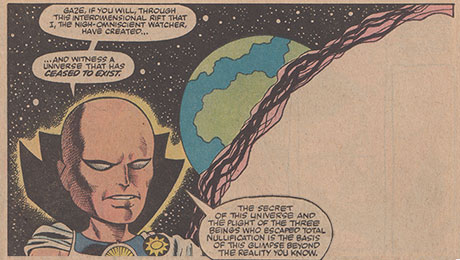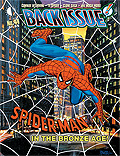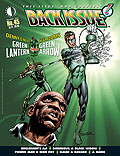While Karen and Doug are on vacation in January, our readers have
been entrusted with carrying on the daily conversations. Today's Open
Forum is a do-it-yourselfer. As we've done in the past, the first
commenter gets to pick today's topic of conversation.
Generally
speaking, the Open Forum is for broader topics. For example, in the
past we've started conversations such as "The Role of Inkers" and
"What's So Great About the Bronze Age?" Start a conversation that is
broad enough to elicit an ongoing conversation, and that even might lend
itself to tangential musings.
Thanks for holding it down for us!
Sunday, January 20, 2013
Subscribe to:
Post Comments (Atom)



















































11 comments:
I find I'm often fascinated by the role that editors play in the development of comic books. We pay a lot of attention to artists (properly) and a good deal of attention to writers, but like as not aside from a mention of Stan Lee here and there, the editor is often overlooked.
Stan's influence at Marvel can be overstated, but it's really hard to do.
Julie Schwartz gets a lot of love, but he was a high profile editor.
Mort Weisinger often gets negative coverage because his abusive personality do dominates stories about him, that we overlook perhaps his work.
Likewise Jim Shooter gets few hugs in the industry, though he did revive the dying monstrosity that Marvel had become in the 80's.
Dick Giordano as artist is outstanding, but it's his role as editor which elevates him in my eyes. His Charlton Action Hero line set the tone for modern editing building on what Stan had accomplished, but with a greater focus on individual talent.
Archie Goodwin might be the best editor of all time. I cannot think of a single time he took over a project that it did not improve, sometimes significantly.
Other names are Joe Orlando, Joe Kubert, George Wildman, Nicola Cuti, Denny O'Neil, and on and on.
What are some other opinions on editors?
Rip Off
I mentioned previously that I just finished MARVEL COMICS: The Untold Story, by Geoff Howe, and the book does focus heavily on the rise & fall, trials & tribulations of the editorial heads and staff. CLEARLY the day-to-day workload for a comic-book editor with more than three or four books is huge. . . and yet, I still came away with no specific understanding of what that day-to-day workload entailed. A LOT of it appeared to be struggling with the writers and artists. . . but it's hard to see how one could spend an entire day just doing that, y'know? I'd love to be better informed on that end.
There did seem to be a tendency at Marvel for the position of Editor in Chief to lead to megalomania (ultimately Stan, to some degree, and then monstrously so w/ Jim Shooter later on), or else it simply ate the office-holder alive w/in a few months-- as with Roy Thomas and pretty much everyone else up to Tom DeFalco. Actually, DeFalco probably should be on your list, there, as he stayed at the helm of a badly-lurching ship for many years (for better or worse), and did his best to balance corporate concerns with those of the integrity of the product. I'm not sure how I'd measure his success, but I don't think I've read any ire directed his way from any source, as opposed to Lee, Shooter, Quesada or other major names.
But, boy, I'd love to know more about the editorial role, specifically.
HB
I think editors should be there to regulate things, like traffic cops. They should make sure everyone is doing their best work in a timely fashion. What bothers me is when they start messing around with the creative side of things. If you want to be a writer, then be a writer, but don't interfere with other people's work and try to to shove your own stuff into it. That's always been my take on it.
Mike W.
I don't know, Mike W-- I do think an editor needs to be a little more hands-on in the creative process than that, since writers (in particular) and artists (to a lesser degree) can't always be trusted to work in a book or character's long-term best interests as they pursue their own particular vision. . . or even short-term "event". Whether the editor serves as a sounding board, or a safety-net, or a steady hand on the ship's wheel, or a trouble-shooter, or even as a task-master/overlord (or heck, as all of the above), I certainly recognize the value of that additional set of eyes minding this frenzied gestalt of a creative process. Strong editors keep Dr. Strange's book from ultimately explaining the origin of God (with a capital "G"); whereas weak/non-existent editors let Gwen Stacy give birth to twin children via Norman Osborn.
Maybe it's all meetings and phone calls and proof-reading and art-correcting? I don't know-- but man, it's clearly a pressure-cooker position (or was) in the comics industry.
HB
At some point I really would like to get ahold of Sean's book--because when all the dust settled at Marvel, the role of editor that we're probably talking about here morphed into that of "Editor in Chief," with another designation of "Editor" applying further down the pole to the editor of individual titles (and consequently getting to the point of having any number of "editors" at Marvel), and perhaps Sean gets into that a little. (At least I hope so--like HB, I'm really curious about not just the role itself but its evolution.) Which is all a long-winded way of saying that the role of "Editor" at Marvel could have been better defined for those outside the Marvel offices, as I usually take a more literal view of the word--which in the case of Marvel comics would be a person who was dealt into the entire creative process for a title's stories in order to ensure a more robust direction for the book as well as the consistency of its various elements.
In that sense, the "Editor-in-Chief" might be more accurately thought of as a traffic director as well as a liaison with the company's owners. We have several "editors" at the publication firm I work with, and none of them are involved with actually making policy in the way that Lee, Shooter, et al. are associated with.
@HB I don't mind a certain amount of "meddling" (you mentioned the Stacy twins...it would've been nice if we were spared THAT storyline), but when they start changing plots (or actual dialogue) to reflect the editor's vision instead of the writer's vision, that's where they lose me.
Marvel seemed to go through lots of editors and they kept changing things all the time (bringing in "line editors" and so forth), but it just seemed to muddy the waters; remember the debacle surrounding the identity of the Hobgoblin? To this day, everyone involved has their own version, and none of them seem to agree with each other.
As for the editor in chief position, I remember Jim Shooter describing his job as "designated fan" in an old Bullpen Bulletins column, but considering the amount of meddling he's said to have done that description doesn't quite seem to fit.
Mike W.
As Karen commented in an earlier post, we will be running two posts in review and discussion of Sean Howe's very fine Marvel Comics: The Untold Story. We'll be dealing with the history of the company up to the ascension of Jim Shooter to EiC on 2/1/13 (our first post back) and then conclude the book with discussion on Tuesday the 5th. We'd invite everyone to study up and prepare for those two discussions, which we hope will be in depth. Consider it homework!
As to Rip's topic today, I'll just add this as a distant observation, claiming no insider knowledge -- I'm just going on the histories I've read. I think the editors at DC Comics from the 1950's onward should almost get a creator-type of credit. From what I've gathered, Julie Schwartz, Mort Weisinger, et al. were highly suggestive of story plots and machinations to the point where the really ruled their little character duchies with iron fists (Weisinger being the more dictatorial of the two I mentioned). Over at Marvel, however, it would appear to me that much of the editing came after stories and art were turned in for proofreading and lettering. From what I can gather, corrections were made in-house often by John Romita or Marie Severin, even John Verpoorten, in the last stages before being shipped to the printer. There are many tales of staffers gathering round freshly unwrapped pages, hot off the mail truck, because no one at Marvel really knew what to expect. I just cannot see that happening at DC, where branding was the name of the game. Marvel's brand was to do the unexpected, by contrast.
Doug
I've got the book on order at the library! May it get here in time!
Sean howe's book has an anti-Shooter slant so please be fair and don't assume his portrayal is God's word
Humanbelly, in your example of a "weak" editor "allowing" Gwen Stacy to have twins father by Norman Osborne, as I recall reading about that event, the writer's original idea was for Peter Parker to have been the father. It was the editor who nixed that idea and insisted that the father should be stormin' Norman. That was really a case of heavy-handed and terrible editorial interference.
Oh, you guys are right about taking any account with a grain of salt, that's true. My sense wasn't that Howe's book came across completely with a terribly anti-Shooter slant, though-- but like Doug suggests, we can certainly hash that out a couple of weeks down the road when it's officially the topic at hand.
Wow, Fred-- I'd never heard that account of the genesis of the Gwen/Norman story. It doesn't work for my example, perhaps, but yeesh, the original (writer's) idea was STILL a terribly bad one that needed to be 86-ed. Unfortunately, this editor (you're right, MUCH too heavy-handed) managed to replace it with an infinitely worse one. Two negatives definitely didn't equal a positive in this case.
Hmm. There must be another example of weak-editor-syndrome that can serve . . .
HB
Post a Comment